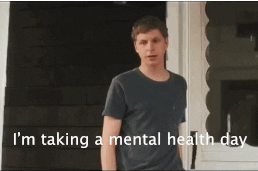Welcome back to another Weekly Roundup, Remote Work Tribe! We’re inching closer to the end of October, so you know what that means—Halloween is almost here! To get into the spooky spirit this week, we want to discuss a topic that might send chills down your spine: mental health.
Mental health is something that absolutely, 100 percent should not be a taboo, but somehow… it is. Here at Remote Work Tribe, we’ve spent the past several weeks diving into research regarding remote burnout, the stigma surrounding mental health, and the anxiety to discuss personal matters in the workplace. It appears that 9 times out of 10, remote workers feel ashamed, embarrassed, or too nervous to admit to a team member or manager that they’re feeling burnt out.
There’s a misconceived notion that burnout equals weakness, or that an exhausted employee simply isn’t pushing hard enough to keep performing. That idea could not be farther from the truth.
Elliot Fung hit the nail right on the head when he posted this tweet earlier this week:
Your mental health does not reflect how “weak” or “strong” you are. It’s the reflection of everything you’ve faced this past year: a global pandemic, social isolation restrictions, and an economic downturn, just to name a few. It’s important to remember that remote workers are not immune to mental health issues or the issues plaguing the rest of society; and feeling anxious, depressed, or burnout is a completely normal response to the stress we’ve been facing.
So, don’t feel guilty taking a mental health day. It is well deserved.

If you’re feeling down on yourself for feeling burnt out lately, consider this tweet as well:
And an expert I know (who happens to share a home with me) would remind us that it’s not our job to survive our work, it’s the job of workplaces to create safe places where we can remain reasonably healthy. You do not burnout, you get burned out by the work and how it gets done.
— Jim Moss (@🏡) (@TheSmileCEO) October 15, 2020
Key lesson here: It’s the job of your workplace to create a safe place for you to work—even virtually. From the amount of Zoom calls you receive each day to simple check-ins among your team members, your remote work environment can and will impact your mental health. It’s on founders, leaders, and managers to ensure a healthy work environment.
Still with us? Awesome! Let’s check out what else was happening in the remote work world this week.

The Tribe’s Weekly Vibes
1. This Ex-CEO’s thread of trials and tribulations regarding his time spent on top.
2. These interesting poll results regarding remote work preference.
3. This reminder to appreciate your current wins by always watering your flowers.
4. This proof that stubborn employers can’t seem to fully comprehend what remote work is.
5. This reminder to stop wasting your employee’s time.
6. This simple adjustment job recruiters should consider.
7. This two-faced email sign off everyone is guilty of.
8. This universal job title to those outside of the Remote Work Tribe.
9. This simple reminder that checking in on a friend is not hard (and is one of the kindest things you can do).
10. This overtake of opinions on which social media platform will tank the most. (Surprised? Or expected? Comment below!)
11. This frustration behind unrealistic interpretations of hard-working job titles.
***
What’s happening in your remote world this week? Tag us over on Instagram, @TheRemoteWorkTribe, or on Twitter, @RemoteWorkTribe, for a chance to be featured on our next weekly thread!


[…] However, it’s important to separate “boredom” from “burnout.” The two are not the same, nor do they have the same negative repercussions on a remote worker’s mental health. […]
[…] (WHO) website.4 But, that’s not to say there’s no longer a stigma surrounding burnout, or mental health topics in general in the workplace — especially among remote […]
[…] a doctor’s visit. Therefore, your manager or team lead should encourage your team to utilize mental health breaks, support your decisions to take vacations, and invite you to spend time with family.Remember, if […]
[…] your one-stop-shop for everything remote work and leadership, from updated remote work policies and mental health strategies to Twitter trends in the […]